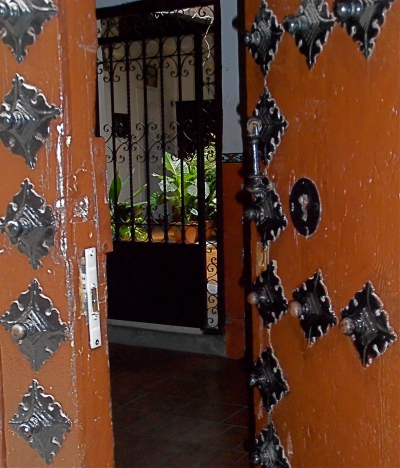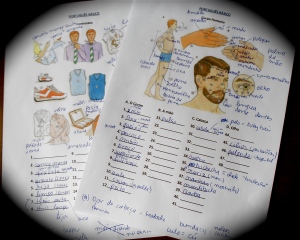Every language I’ve ever tried to absorb just from books, classes, and, in recent years, the internet, I’ve forgotten. Sure, there may still be some linguistic remnants floating about in the murky Everglades of my brain – rotting limbs of Russian, Japanese and Chinese trapped in the undergrowth – never to be re-assembled again in a futile attempt of making conversation.
It comes down to this: If you want to speak a language, and I mean REALLY speak it, it’s not enough to allot it a fenced-off little corner of your consciousness and shine a torch on it every once in a while. Language is the most sophisticated communication tool ever devised by the human mind; it is designed to allow people to share complex thoughts, infectious ideas and a laugh, to convey their feelings, to empathise with each other. Language needs to be taken out to play, it needs a human connection to really thrive.
As enjoyable as it is to be totally hooked on a book or engrossed in an epic film, language acquires a whole other dimension through person-to-person interaction. When you’re using your verbal and your listening skills to build a relationship with another human being – whatever the nature of that relationship may be – that’s when language really comes alive.
With one’s native language, this happens naturally, but, as most of us will have experienced, when we try to learn a foreign language in an environment where real-life exposure is limited, our enthusiasm usually peters out way before anything resembling fluency is achieved.
Going to class once a week, reading the occasional newspaper article, spending a holiday once every while in a country where the target language is spoken, although useful parts of the learning process, these sporadic activities are not going to push anyone beyond tourist-level competency.
If you want to get more out of it, you need to put more into it, and I’m not just talking more of your precious time. You need to let the language mesh with the fabric of your life, to entice its little tendrils to find their way from your head into your heart.
In practice, this means creating firm links with the country where the language is spoken and/or building and maintaining mutually enriching friendships with native speakers. In this way, you create an emotional dimension rather than limiting yourself solely to the intellectual domain. The former is much more permanent than the latter, it stays with you for life, it doesn’t just slip from your memory banks like a dried-up verb table.
As I’ve already lamented, a number of languages I had spent some time learning in the past never made it beyond the launch pad, because I failed to integrate them into my life in a meaningful way. My three main languages, German, English and Spanish, on the other hand, are firmly rooted in my psyche. They are not just something I “do” twenty minutes or so each day. They are part of who I am. If one of them were taken from me, it would be like losing an arm.
German is my native language, and although I left Germany back in 1991, I still have family and friends there. As for English, I lived in the UK for over two decades, virtually all of my adult life, and so I maintain a rash of personal and professional connections with this country, which, incidentally, I still consider to be my home. Also, my day-to-day work life takes place in English. English is, if you will, my main operating language.
And Spanish… well, Spain is where I live right now, so my attachment to this country is growing deeper by the day, as I’m slowly crawling towards greater proficiency in the language. I guess I should point out that my primary reason for moving to Spain was, in fact, to get to grips with Spanish, a desire I’ve been harbouring ever since I was a teenager.
Besides tinkering with my Spanish, I’ve embarked on another linguistic challenge, which is Portuguese. I started learning just a bit over a year ago, and I guess it’s time to start thinking about how I’m going to weave those loose strands of Portuguese into my world. Moving to Portugal is not an option right now, that would be too much of an upheaval too soon, and my level of Spanish still leaves much to be desired.
The good thing about being in Spain is that Portugal is right next door, and that flights are pretty affordable. Before I packed my bags to come to Spain almost three years ago, I signed up for a couple of week-long stints with a language school here. They arranged accommodation for me with a local couple who I’m still friends with, and I made my first few contacts from that base. Seeing as that strategy had already served me so well, I was thinking of taking the same approach with Project Portuguese.
When I started thinking about this a bit more in detail, however, I had a realisation: I don’t actually want the language school bit. The truth is that I don’t enjoy spending hours and hours in a classroom. I’m often left so worn out, that all I want to do afterwards is lie flat on a bed with a wet flannel over my eyes. Plus, I do have a great Portuguese teacher who I see every week, so I’ve got the teaching part covered. The whole point of being in Portugal is to get some practice, to interact with Portuguese people, not have a forced conversation with a Dutch classmate.
Well, I thought, why not try and find someone in Portugal prepared to rent out a spare room to me for a week or so? That would give me the chance to talk about everyday domestic stuff, exchange a few opinions over breakfast, and maybe do some grocery shopping together. After all, I don’t need a 24/7 babysitter nor a full-time tour guide, I can entertain myself and, as a roving freelancer, I shall bring my laptop and my work with me. I can also offer a language exchange, if they wanted to practice their English or their German.
So, this is going to be my new project 🙂
A friend of mine has already passed me a potential contact, which I still need to follow up. If anyone out there has any useful suggestions or knows someone in Portugal who may be interested, please get in touch.
* * * *
[What does it take until you finally “sound like yourself” in another language? Here is a post I wrote on this topic.]







